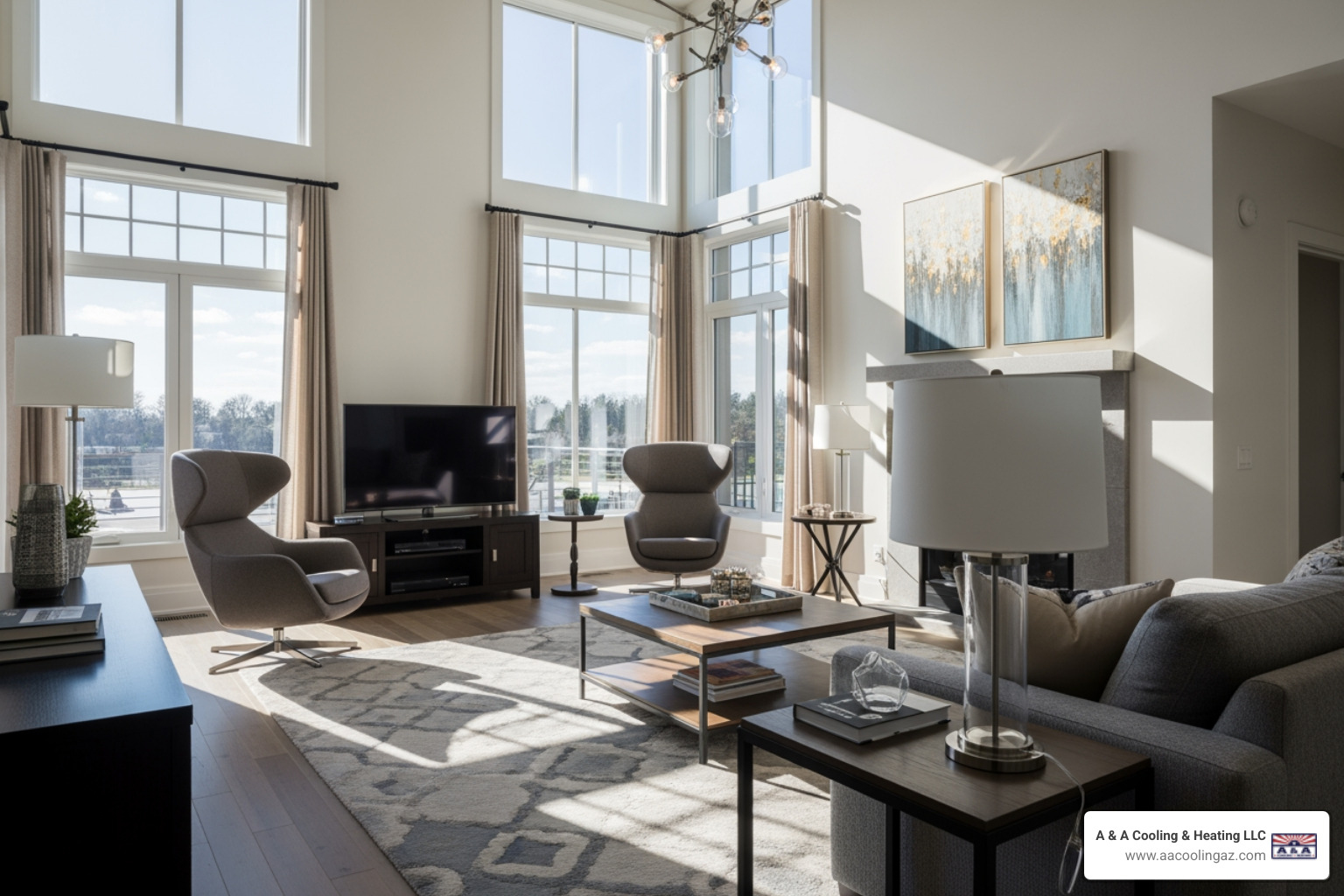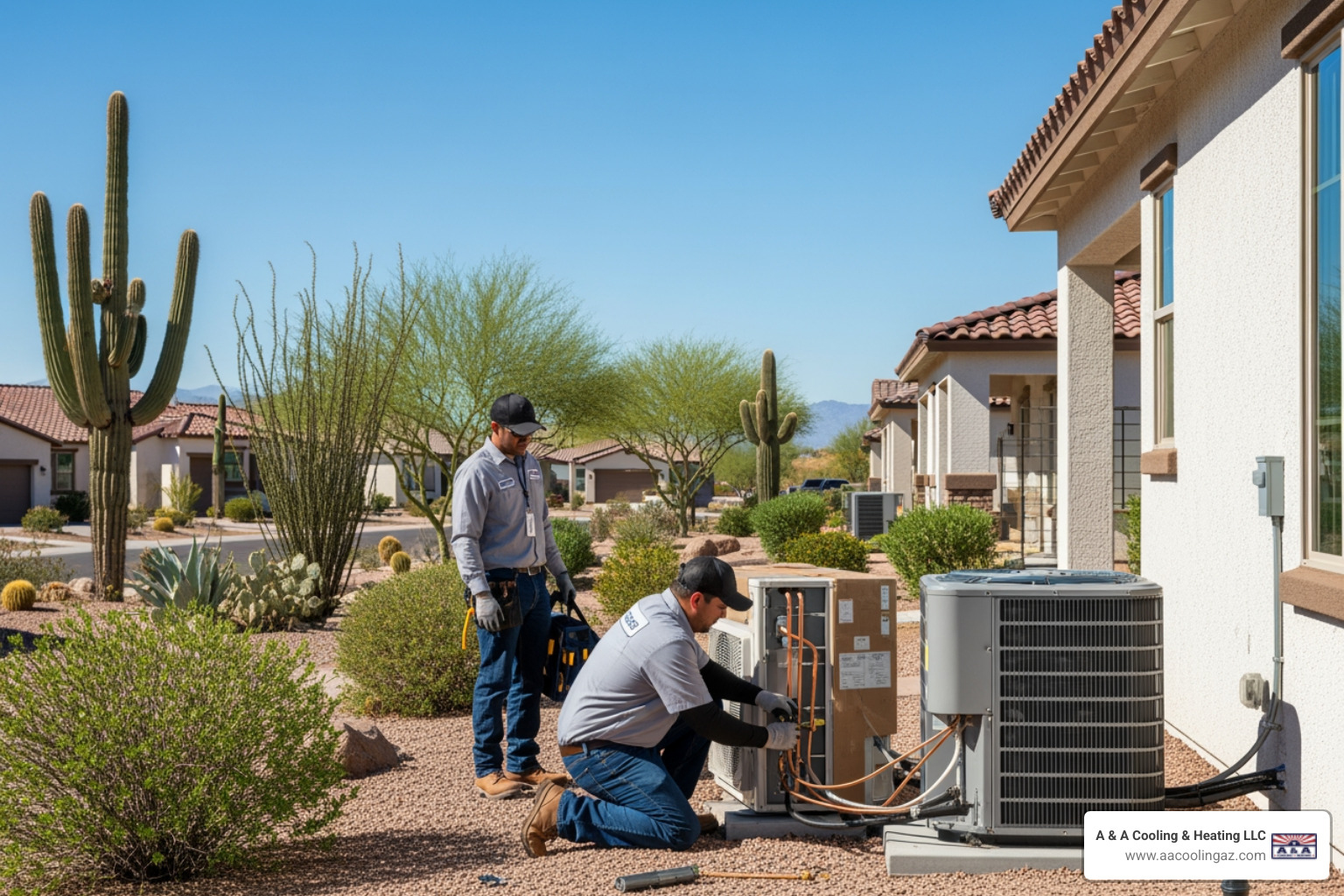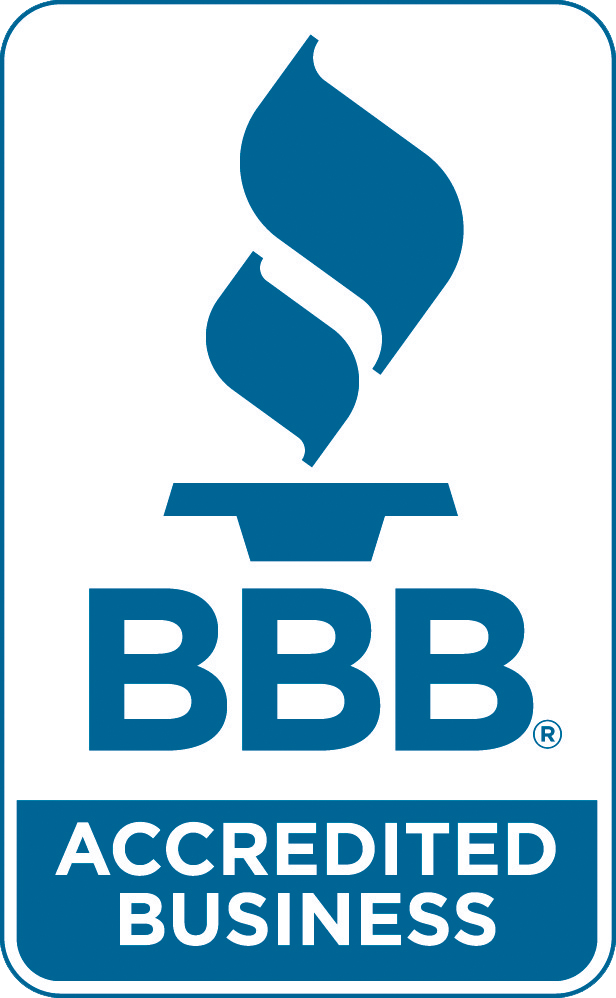The Mystery of the Non-Cooling AC: Solved!
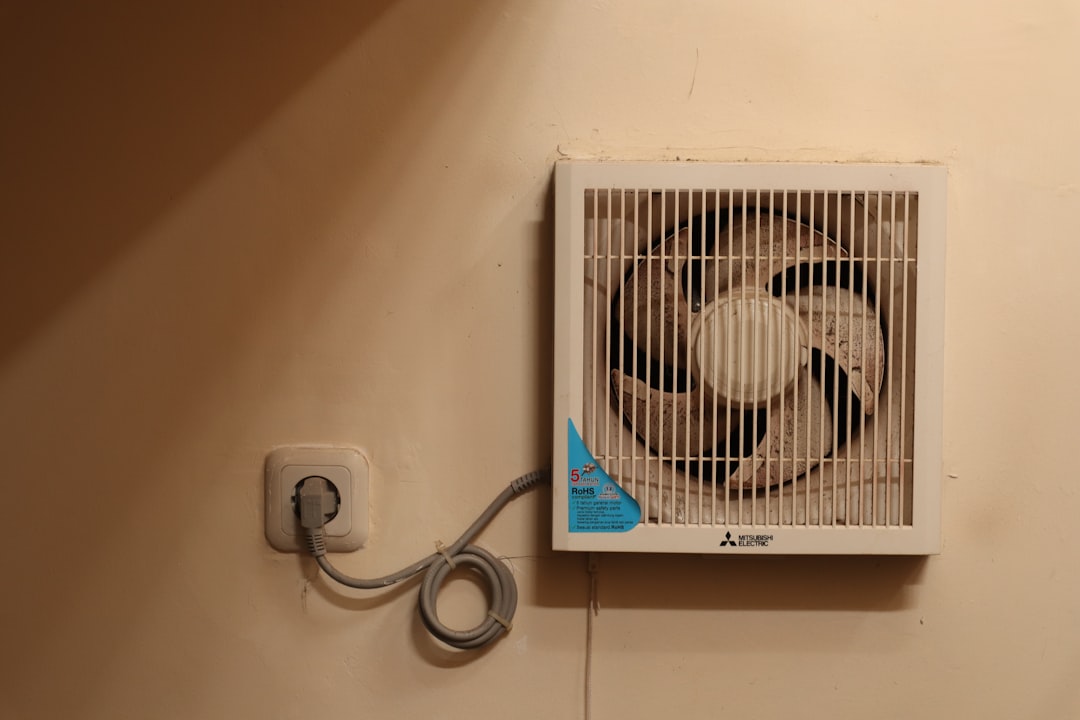
Why Is My House So Hot?
When your ac not cooling problem hits during an Arizona summer, it's a crisis. Instead of a refreshing blast of cold air, you're greeted by stuffy, warm rooms that offer no relief from the outdoor heat.
Quick Diagnosis for AC Not Cooling:
- Check thermostat - Is it set to "cool" mode and below current room temperature?
- Inspect air filter - Replace if dirty or clogged (every 1-3 months)
- Clear outdoor unit - Remove debris and ensure 2 feet clearance around condenser
- Look for ice - Frozen coils indicate airflow or refrigerant problems
- Listen for sounds - Hissing or unusual noises may signal refrigerant leaks
- Check vents - Ensure all registers are open and unblocked
- Reset breaker - Power issues can prevent cooling
- Call a professional - For refrigerant leaks, electrical problems, or compressor issues
With over three-quarters of all homes in the US having air conditioners, AC problems are a common frustration. The good news is that many cooling issues have simple solutions you can handle yourself.
However, some problems require immediate professional attention—especially refrigerant leaks that can pose health risks or electrical issues that create safety hazards.
Understanding the difference between a quick DIY fix and a serious system failure can save you time, money, and discomfort. Let's walk through the most common reasons your AC stops cooling and what you can do about each one.
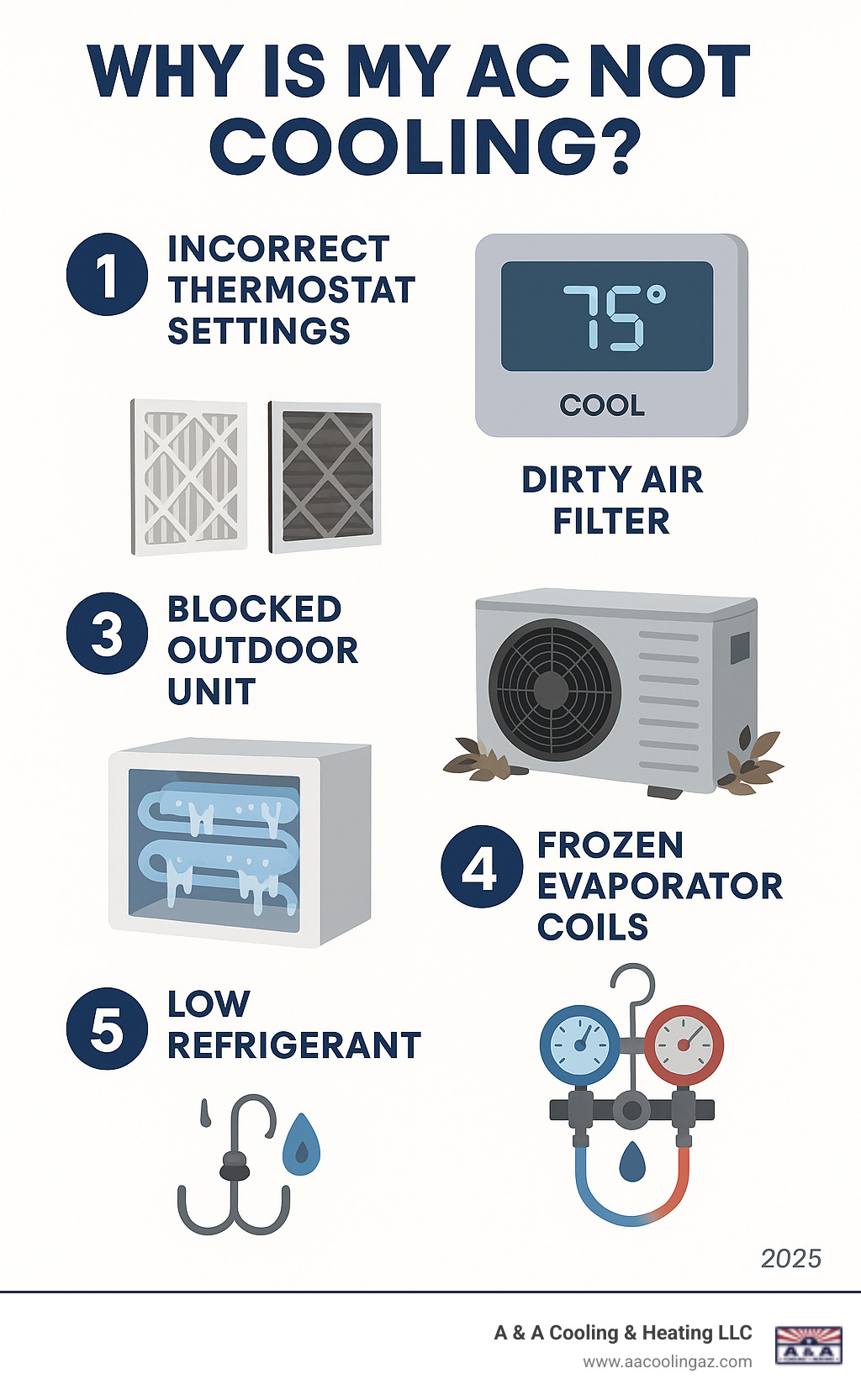
First Steps: Simple Troubleshooting You Can Do Right Now
Before panicking, let's explore some simple checks that often solve the mystery of an ac not cooling. These are surprisingly common culprits and can get your system blowing cold air again quickly.
Check Your Thermostat
The thermostat is the first and easiest place to troubleshoot. An incorrect setting can cause unnecessary discomfort. First, ensure it's set to "cool" mode, not "heat" or "fan only." If it's on "fan only," your system will just circulate warm air.
Next, check the temperature setting. It must be set lower than the current room temperature for the AC to turn on. We recommend setting it 5-6 degrees below the current temperature to test if the unit responds. You should hear the outdoor unit start and feel cool air from the vents after a few minutes.
If your thermostat has batteries, try replacing them, as low batteries can cause erratic behavior. For smart thermostats, a reboot can often resolve glitches. Also, consider its placement. Is it in direct sunlight or near a heat-generating appliance? This can cause your AC to overwork or cool unevenly. Proper placement ensures your AC cools based on your home's actual needs.
Inspect and Clean Your Air Filter
This is one of the most common and easily fixed reasons for an ac not cooling. Your air filter is the system's first line of defense against dust and dirt, but it must be clean to work properly.
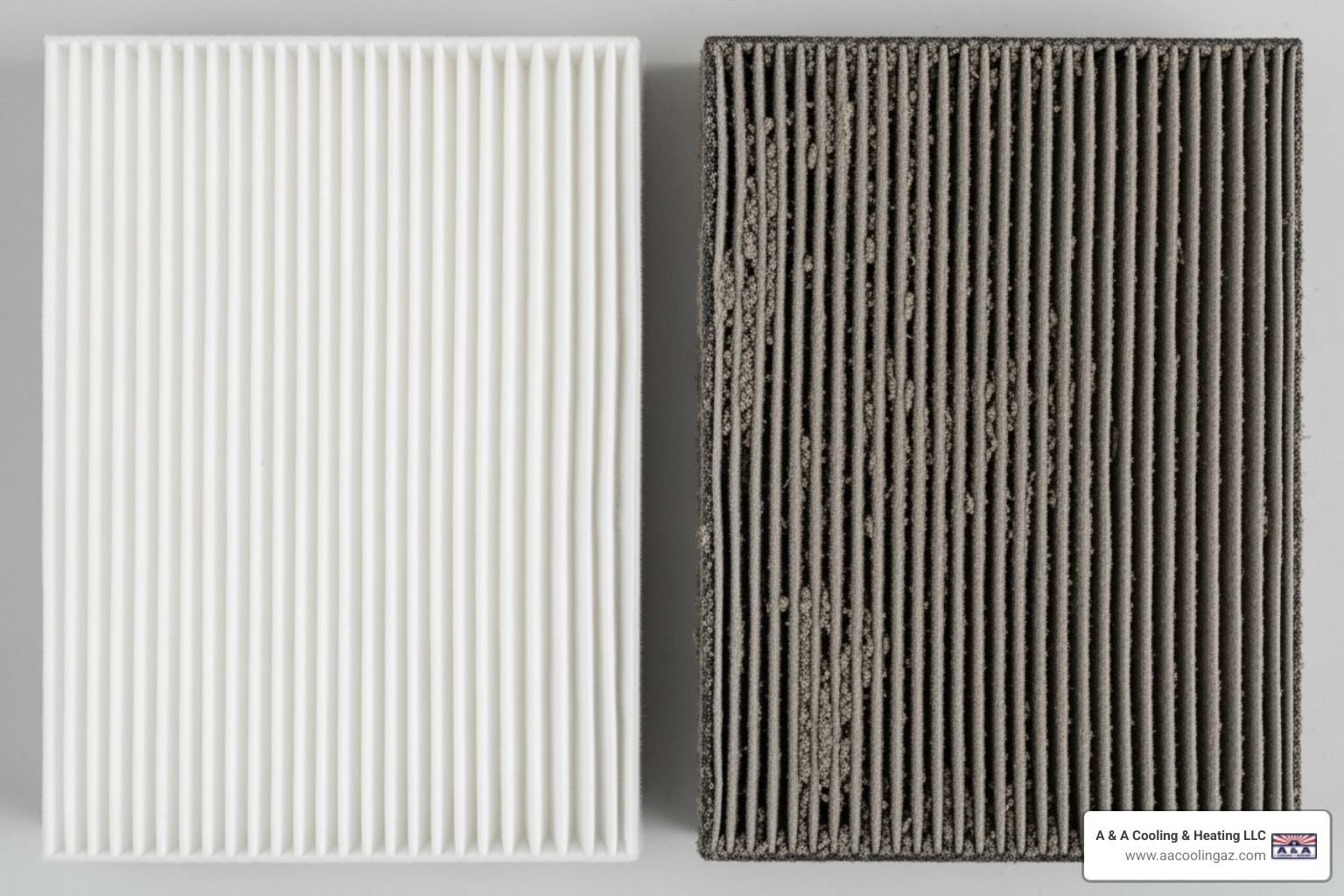
A dirty air filter severely restricts airflow, making your AC work harder. This can cause the system to overheat and the evaporator coils to freeze. It also leads to poor indoor air quality and higher utility bills.
Most air filters are in a slot at your indoor air handler or return air vent. If it's grey with dust, it's time for a change. We recommend replacing disposable filters every 1-3 months, especially during peak cooling seasons or if you have pets. If you have reusable filters, wash them monthly and ensure they're completely dry before reinstallation. This simple step can drastically improve your AC's performance.
Clear Your Outdoor Condenser Unit
Your outdoor AC unit, or condenser, releases heat from your home. If it's blocked, that heat has nowhere to go, and your ac not cooling problems will continue.
The condenser is a large, box-like unit with a fan on top. Over time, leaves, grass clippings, and dirt can accumulate around it, acting like a blanket and preventing it from dissipating heat.
We recommend maintaining at least 2 feet of clear space on all sides of your outdoor unit. Trim back any overgrown bushes or weeds. To clean it, turn off the power at the circuit breaker and the outdoor disconnect switch. Then, you can gently rinse the condenser coils with a garden hose, spraying from the inside out to push dirt away. This simple annual cleaning can significantly improve your AC's efficiency. Never reach inside a running unit.
Why Your AC is Not Cooling: Diagnosing Deeper Issues
If the simple troubleshooting steps didn't solve your ac not cooling dilemma, it's time to look at more complex issues. While these often require professional help, understanding the problem can help you explain it clearly when you call for service.
The Problem with Frozen Evaporator Coils
It's surprising, but sometimes an AC stops cooling because it's literally frozen solid. When your evaporator coils turn into a block of ice, they can't cool your home.
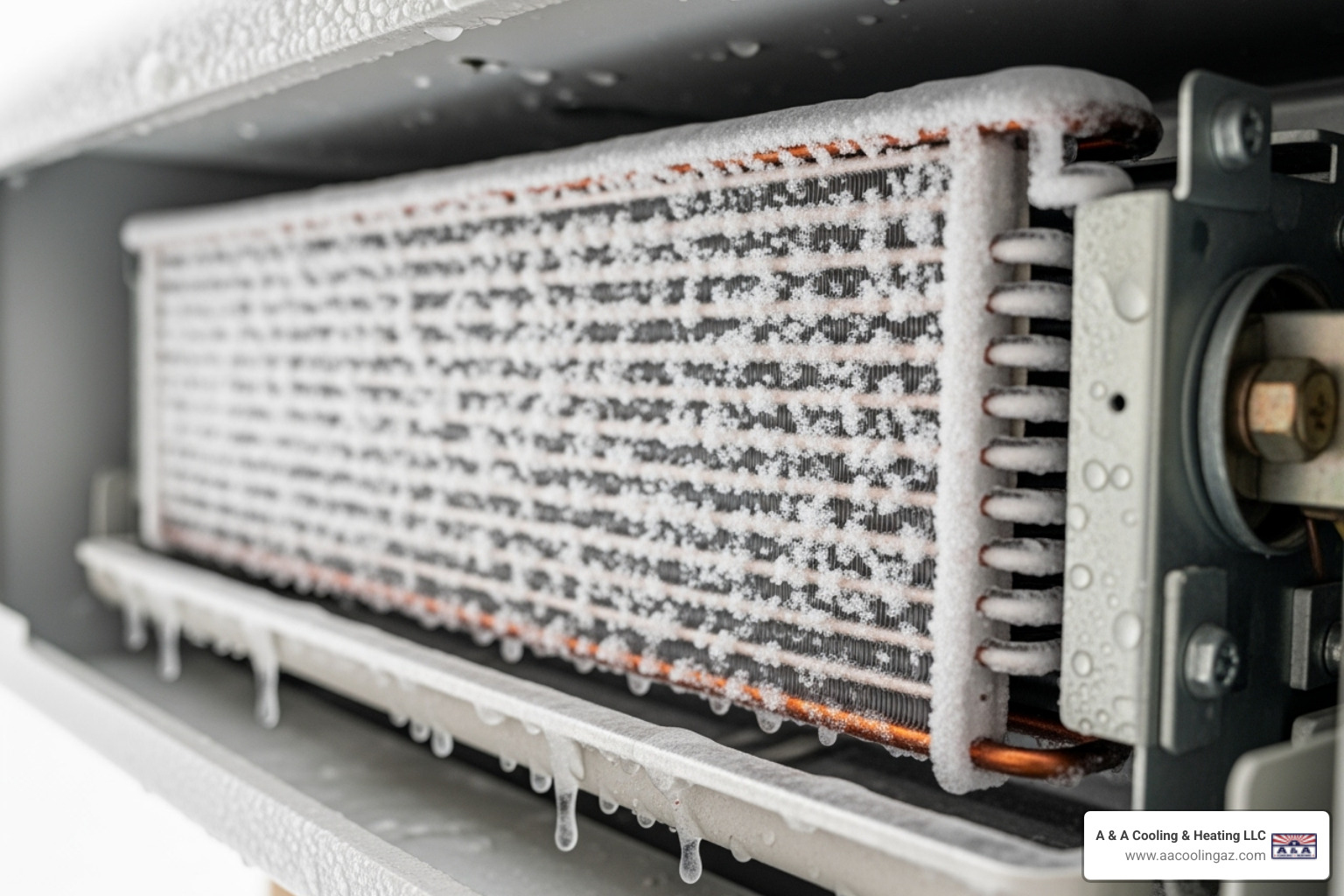
Evaporator coils absorb heat from the air. When airflow is restricted—usually by a dirty filter or blocked vents—the coils don't get enough warm air. They get too cold, and moisture in the air freezes on them.
Low refrigerant can also cause this. When refrigerant levels drop, the coils can't absorb heat properly, causing their temperature to plummet below freezing. The ice buildup then insulates the coils, completely blocking airflow and stopping the cooling process.
If you find frozen coils, turn off the cooling immediately but leave the fan running to help melt the ice safely. This can take several hours. Place towels around the unit to catch water. Once thawed, check your air filter and vents.
However, frozen coils are usually a symptom of a bigger problem. If they freeze again after thawing, it's time to call a professional. Never try to chip the ice off yourself, as the coils are delicate and expensive to replace.
Understanding Low Refrigerant and Leaks
Refrigerant is the chemical that makes heat transfer happen in your AC. When levels are low, your system can't cool properly, and you'll have an ac not cooling problem.
Crucially, refrigerant doesn't get "used up." In a sealed system, levels should remain consistent. If your refrigerant is low, you have a leak. This is not just an efficiency problem; refrigerant poisoning can occur from inhaling these chemicals, making it a job for professionals.
Signs of a leak include:
- Hissing or bubbling sounds from your AC lines.
- Ice building up on your coils.
- Weak, barely cool air from your vents.
- Rising energy bills as your AC works overtime.
- A sweet, chemical smell near your vents.
Simply "topping off" the refrigerant is a temporary fix that doesn't solve the underlying leak. Professional HVAC technicians have specialized equipment to detect and repair leaks properly, then recharge your system with the correct amount of refrigerant. This is precise work that requires certification and training.
Reasons Your AC is not cooling due to Ductwork Problems
Your AC might be producing cool air, but if it can't reach you, you still have an ac not cooling situation. Your home's ductwork is often the culprit.
Your ducts are the delivery system for cool air. When there are leaks and holes, a significant amount of that air escapes. In fact, about 20–30% of the air that moves through your home's duct system is lost due to leaks, holes, and poor connections. This means you're paying to cool your attic or crawl space instead of your living room.
Blocked registers from furniture or closed dampers also create problems, forcing your system to work harder and creating hot and cold spots. Damaged ducts can pull in dust and allergens from unconditioned spaces, reducing air quality and forcing your AC to work overtime.
This leads to uneven temperatures, higher utility bills, increased dust, and a reduced system lifespan. While you can check for obvious blockages, diagnosing and sealing duct leaks requires professional expertise.
Critical Failures: When to Suspect Major Component Issues
Sometimes an ac not cooling problem points to a serious component failure. These issues require professional diagnosis and repair, and ignoring them can lead to complete system failure or safety hazards.
Compressor and Fan Motor Issues
The compressor is the heart of your AC system, circulating refrigerant to enable cooling. When this vital component fails, your ac not cooling problem becomes serious.
A failing compressor often announces itself with loud grinding, banging, or rattling noises. You might also notice your circuit breaker tripping repeatedly as it tries to protect itself from the strain.
However, the issue isn't always the compressor itself. A failed capacitor (a component that gives the compressor its starting boost) can prevent the compressor from starting, even if the compressor is fine.
Your outdoor fan motor is also crucial. It drives the fan that helps release heat from your home. If you see the unit humming but the fan blades aren't spinning, you likely have a fan motor problem.
Diagnosing and repairing these critical components requires specialized equipment and involves handling high-pressure refrigerant and electrical parts. It's a job for a professional, who can also assess if the failure indicates your system is nearing the end of its life.
Electrical Problems Impacting Your AC
Electrical issues can cause your ac not cooling situation to become confusing, as the system may fail completely or behave erratically.
A tripped circuit breaker is a common culprit. Your AC draws significant power, and an overloaded circuit will trip the breaker as a safety measure. Central AC systems typically have two breakers: one for the indoor unit and one for the outdoor unit. Check both. If a breaker trips again after you reset it once, there's a larger problem that needs professional attention.
Blown fuses in older systems can also cut power and must be replaced. More complex issues like faulty wiring, corroded connections, or failing capacitors and contactors require professional diagnosis. These components can fail from wear and tear, pest damage, or poor installation.
While checking a tripped breaker is simple, anything beyond that is dangerous. High-voltage electricity is unforgiving, and attempting electrical repairs without training can result in injury, fire, or further system damage. When in doubt, call a professional.
The Impact of Improper AC Sizing
Sometimes, an ac not cooling problem stems from an improperly sized unit. It's not broken; it was never the right fit for your home.
An undersized unit runs constantly but never reaches the set temperature. This leads to high energy bills, uncomfortable warmth, and excessive strain on components, shortening the system's lifespan.
An oversized unit cools the home too quickly, shutting off before it can properly dehumidify the air. This "short cycling" results in a clammy, uncomfortable feeling. The frequent starting and stopping also wastes energy and wears out components faster.
Proper AC sizing requires a professional load calculation, which considers your home's square footage, ceiling height, insulation, windows, local climate, and occupancy. It's a science that ensures your AC matches your home's unique needs. If your system runs constantly or short cycles, improper sizing could be the root cause.
The Solution: When to Call a Pro and The Power of Prevention
When you have an ac not cooling, the main question is whether you can fix it yourself or need to call a professional. Knowing the difference can save you time, money, and frustration. Ignoring cooling problems rarely makes them go away; small issues often grow into expensive headaches.
Deciding Between DIY and Professional Repair
Some AC troubleshooting is simple, while other issues require a professional. Knowing which is which is key.
DIY jobs you can safely handle include:
- Checking your thermostat settings.
- Replacing or cleaning your air filter.
- Clearing debris from your outdoor unit.
- Resetting a tripped circuit breaker (once).
- Checking for blocked vents.
Professional jobs are required for more complex and dangerous tasks:
- Handling refrigerant (requires certification by law).
- Diagnosing recurring frozen coils.
- Any electrical work beyond resetting a breaker.
- Repairing compressor or fan motor problems.
If your AC is making strange grinding, hissing, or buzzing noises, or if you smell something burning, call us immediately. The same applies to ductwork issues and AC sizing problems. When in doubt, prioritize safety and call a professional.
The Importance of Regular AC Maintenance
Regular maintenance can prevent most ac not cooling emergencies by spotting trouble early. Just as your car needs regular oil changes, your AC needs attention, especially in Arizona where it works hard for months.
Preventative tune-ups offer numerous benefits. A well-maintained AC runs more efficiently, lowering energy bills and providing consistent cooling. We catch minor issues before they become major repairs, extending your system's lifespan. During maintenance, we clean coils and check filters, improving your indoor air quality. Perhaps the biggest benefit is peace of mind, knowing your AC is ready for summer.
Our Cool Club maintenance plan is designed for homeowners who want to prevent problems. It's a small investment that pays dividends in comfort, efficiency, and avoiding emergency repair calls.
The Consequences of Ignoring AC Cooling Problems
It's tempting to ignore minor AC issues, but they rarely resolve themselves and often worsen over time, leading to more significant consequences.
- Higher Utility Bills: A struggling AC works harder, which shows up on your energy bill.
- Complete System Breakdown: A small problem can trigger a chain reaction. A dirty filter can lead to frozen coils, which can strain and destroy the compressor.
- More Expensive Repairs: A small refrigerant leak that's affordable to fix today could damage your compressor tomorrow, leading to one of the most expensive AC repairs.
- Poor Indoor Air Quality: Dirty coils or leaky ducts can circulate dust, allergens, and mold spores.
- Water Damage: Melting ice from frozen coils can overflow and damage ceilings, walls, or floors.
The bottom line is that addressing an ac not cooling problem promptly is always less expensive and stressful than waiting for an emergency. Early action is your best defense against major AC troubles.
Get Your Cool Air Back for Good
An ac not cooling doesn't have to be stressful. This guide equips you to handle simple fixes and recognize the warning signs of more serious issues like refrigerant leaks or compressor problems.
Start with the basics: check your thermostat, replace the air filter, and clear debris from your outdoor unit. These simple steps solve a surprising number of cooling problems.
However, some issues require professional expertise. For electrical problems, refrigerant leaks, recurring frozen coils, or strange noises, it's time to call the experts. Your safety is paramount, and attempting complex repairs can lead to injury or costly system damage.
At A & A Cooling & Heating LLC, we've been helping Apache Junction residents stay cool since 1976. Our experienced technicians can diagnose your ac not cooling problem quickly and provide honest, reliable solutions to make your home a comfortable oasis again.
Sometimes, extensive repairs on an aging system aren't practical. If your AC requires major component replacements, upgrading to a high-efficiency system might be your best option. Modern units are far more efficient, leading to lower energy bills and consistent comfort. Learn more about our AC installation services to explore your options.
Don't suffer in the heat. Whether you need a quick diagnostic check or are ready to explore a system upgrade, we're here to help you get your cool air back for good.







